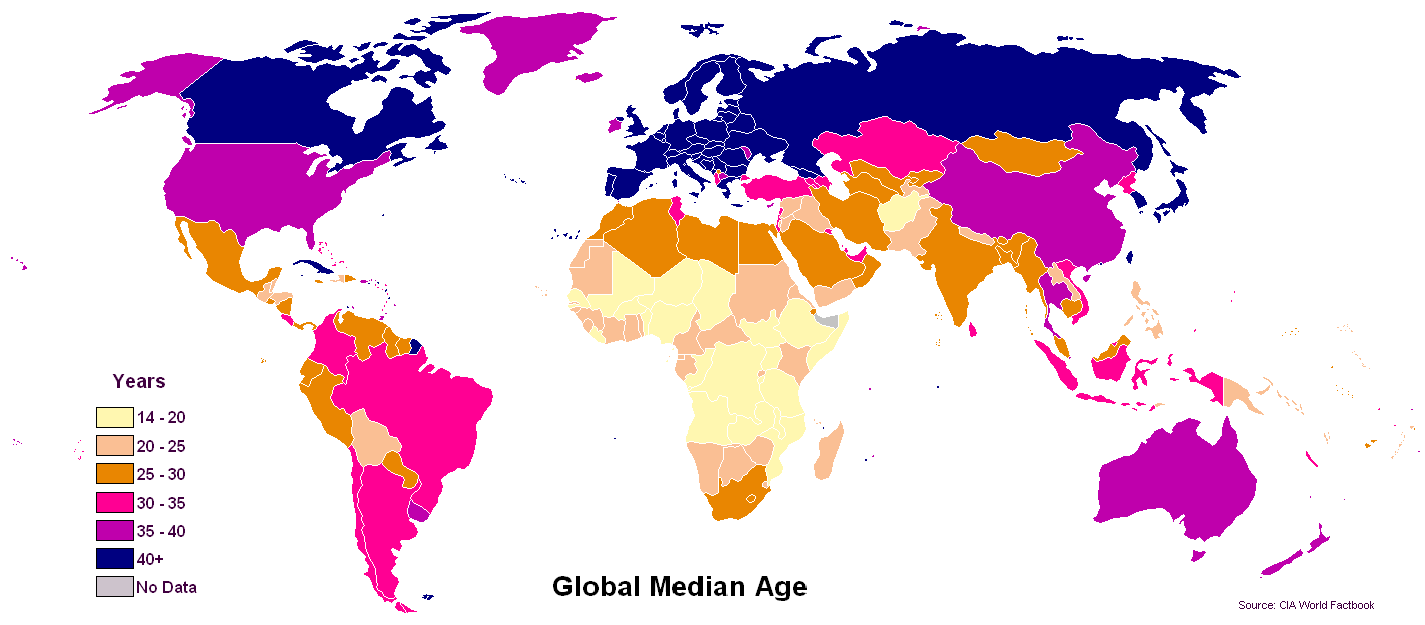THE RISE OF THE ARAB BABY BOOMERS
Study the map and note that the median age in the Arab Middle East is between 20 and 25.
The powers that be, including the US Department of State, have been well aware of the approaching fire but were not sure how to prevent being burned by it. The Arab ruling elites hoped to export it. They encouraged emigration and extremism. 9/11 symbolized their success. Europeans responded with efforts to reduce the number of migrants while appeasing their growing Middle Eastern minorities. Asian powers gleefully exploited Western focus on the troublesome cohort.
The United States did what it usually does. It reasserted its belief that the most efficient and ethical manner to deal with troublesome youth is democratic power sharing. Iraq was set up as a democratic laboratory and, as should have been expected (though unfortunately it was not), the Arab elites did all in their power to undermine the Iraqi experiment and Palestinians elected Islamist Hamas to rule Gaza.
Ironically, while the democratic experiment won in Iraq, it lost in the United States. Americans balked at the high price in blood and treasure and voted for the party that promised them it could achieve better results at lower costs. Barack Obama did not seek the ouster of Arab kings and dictators. Instead he bowed humbly to them. He promised he would end American democracy promotion. President Obama did not only talk the talk in his speech in Cairo, he also walked the walk. Consider the following exchange between Christiane Amanpur and Secretary of State Hillary Clinton:
AMANPOUR: It is beyond dispute that the Obama administration scaled back their democracy and freedom agenda of the Bush administration. In Egypt, the funds for NGOs and the like, civil society, democracy-building, were cut back and furthermore were directed, when they were directed, to NGOs that were supported by the Mubarak regime. Was that a mistake?Clinton: Well, first of all, I just reject the premise. I think that there is...
AMANPOUR: It's -- it's indisputable.
CLINTON: Well, it's not. That's just not -- that's just not the case. There were differences in approach under the same set of goals to try to promote democracy, economic opportunity, women's rights, labor organizing. There are many different ways that I think all of us, different administrations, different experts, have struggled with.
Clinton's ambivalence is understandable. It is possible that decades of anti-American propaganda created an Arab youth so viscerally anti-American that the only way to get the youth to oppose their ancien regimes is for them to believe that in doing so they are standing up to America. Hence, anyone seeking power under the current conditions may have to assert their opposition to infidels, America and, of course, Israel. Indeed, there is little doubt but that the next few weeks, months and years are going to be more than challenging. They are going to be dangerous.
But it is important to avoid past errors. Many revolutions are radicalized by wars. Given the relatively benign great power relations, such wars may be avoided. The viciousness of the Iranian regime has been unmasked in 2009 as has been the rashness and lack of judgment of Hamas and Hezbollah. It is just possible that the emerging Arab leadership would chose to follow in the footsteps of India rather than in that of Venezuela.
Arab Baby boomers know that"the whole world is watching." They crave real respect rather than the patronizing kind offered by Barack Obama and his ilk to Iran and North Korea. They know that such respect is ultimately limited to liberal democracies and they just may wish to prove that there is nothing in the Arab or the Muslim culture that prevents them from demonstrating that they, too, can rule themselves decently. Moreover, as has become more and more obvious, many highly successful members of their Western diaspora are standing ready and able to help them navigate the difficult transition.
Affectionate treatment of youthful transgressions has been a hallmark of recent Western civilization. Will it emerge as a feature of the Arab one or will Arab elders continue to insist that Muslim culture demands that the young love death more than life? The size of the youth cohort undermines the value attached to each one of its members and, as noted, the size of the Arab youth cohort is large. Hence, much will depend on the international opinion refusal to adopt a politically correct pasture insisting instead on the importance and value of each and every young Arab life lost in the struggle.
In short, hope may yet prove to be naive but not absurdly so.
